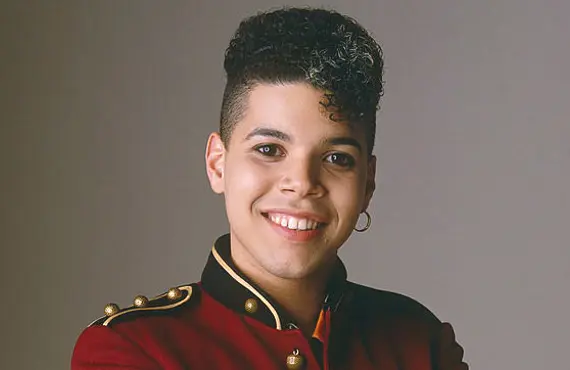The Enduring Legacy of My So-Called Life's Rickie Vasquez
-
 Wilson Cruz as Rickie Vasquez in My So-Called Life (ABC)
Wilson Cruz as Rickie Vasquez in My So-Called Life (ABC)"Can I just ask you something? Why are you making this big play for Corey Helfrick when you know I feel about him?"
These were the words of Rickie Vasquez in the "Betrayal" episode of My So-Called Life, but they were also a cry from the hearts of gay boys everywhere with secret crushes on their classmates. And 25 years later, they're a reminder of why Rickie remains one of the most fully realized queer characters ever to appear on TV.
So about that Corey Helfrick: He was an arty student who attended Liberty High, where Rickie (Wilson Cruz), Angela (Claire Danes), and the show’s other teenage characters went to school. Rickie had a crush on him from afar, meaning he mostly just swooned about him to his lady friends and felt very warm feelings when he saw Corey’s forearm muscles flexing as he tied his shoes.
But when you’re a teenager, that’s a lot! So when Angela made a pass at Corey in a misguided attempt to get revenge on her friend Rayanne (A.J. Langer), Rickie was understandably hurt. He knew that Angela was just acting out, but why did she have to choose his crush to do it?
Granted, this incident was just a blip in MSCL’s famously short, 19-episode run on ABC during the 1994-1995 season. It was certainly not the most dramatic thing that happened to Rickie, who got kicked out of his house by his homophobic family and wound up turning to his gay drama teacher for a place to stay.
But the Corey Helfrick incident was one reason Rickie’s plight resonated so deeply. As a character, he wasn't just a collection of social-issue signposts and teachable moments for the straight leads. He was a complex teenage boy with a full inner life. Like any teenager, his confused heart was capacious enough to contain both the anguish over his family’s rejection and the burning hope that the cute boy building the sets for Our Town would accidentally touch his shoulder. Plus, he also had time to discuss fashion, hate social studies, and wonder why Kafka’s short stories were so weird.
In other words, Rickie brimmed with the small details that make a person seem real. Thus, when he went through hard times, we knew enough about him to more fully understand his reactions. And when he danced like this with Delia Fisher, we knew exactly how freeing it was.
Because he was so recognizably human -- and played with such skill by Cruz -- Rickie felt like a miracle of gay representation. If you were a gay teenager watching him, he might make your own adolescence feel less bizarre. If you were a gay adult, he might give you immediate access to the fumbling innocence of your own awkward youth.
No matter who you were, Rickie might have given you hope for the future. Take Rickie’s bathroom of choice: Throughout the series, he was constantly hanging out in the girls’ room, chatting with his friends and escaping the humid nightmare of male energy in the boys’ room. This was a valuable plot device, since Rickie needed to hear the secrets spilled by Angela and Rayanne at the sink, but it was also a defiant act, unique on television in the mid-'90s. Every time he went in the girls’ room, Rickie Vasquez erased lines that were supposed to divide boys from girls. He needed that space to feel safe, and by allowing him in, that space became liberatory.
Even 25 years later, Rickie is still a remarkable character, and it still stings that he only got to exist for 19 episodes. But he did exist, and we can see his legacy in everything from The Fosters to Modern Family to Lady Bird. Plus, if we ever need a pick-me-up, we can imagine Rickie today, with his arm wrapped around his true love, chuckling as he recalls his teenage crush on some boy in his class named Corey.
What did Rickie mean to you? Weigh in on our forums.
Mark Blankenship has been writing about arts and culture for twenty years, with bylines in The New York Times, Variety, Vulture, Fortune, and many others. You can hear him on the pop music podcast Mark and Sarah Talk About Songs.
TOPICS: My So-Called Life, Wilson Cruz, LGBTQ
- Jason Katims Reveals the Connection Between Dear Edward and My So-Called Life
- Claire Danes’ Genius Shines Through In the Penultimate Episode of Fleishman Is in Trouble
- Needle Drop: The Greatest Music Cue in All of My So-Called Life
- Jared Leto isn't sure if he was invited to My So-Caled Life's virtual pandemic reunion